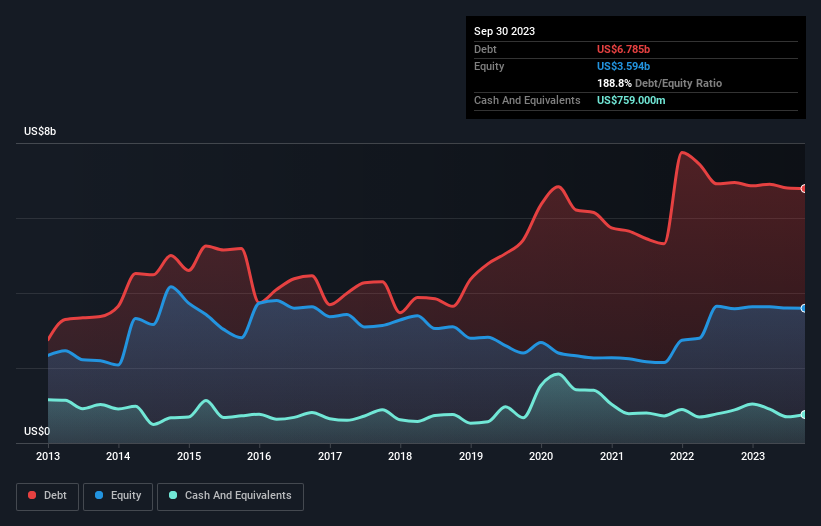- United States
- /
- Wireless Telecom
- /
- NasdaqGS:TIGO
Is Millicom International Cellular (NASDAQ:TIGO) A Risky Investment?

Legendary fund manager Li Lu (who Charlie Munger backed) once said, 'The biggest investment risk is not the volatility of prices, but whether you will suffer a permanent loss of capital.' So it seems the smart money knows that debt - which is usually involved in bankruptcies - is a very important factor, when you assess how risky a company is. We note that Millicom International Cellular S.A. (NASDAQ:TIGO) does have debt on its balance sheet. But should shareholders be worried about its use of debt?
What Risk Does Debt Bring?
Debt is a tool to help businesses grow, but if a business is incapable of paying off its lenders, then it exists at their mercy. Part and parcel of capitalism is the process of 'creative destruction' where failed businesses are mercilessly liquidated by their bankers. While that is not too common, we often do see indebted companies permanently diluting shareholders because lenders force them to raise capital at a distressed price. Of course, debt can be an important tool in businesses, particularly capital heavy businesses. The first thing to do when considering how much debt a business uses is to look at its cash and debt together.
Check out our latest analysis for Millicom International Cellular
What Is Millicom International Cellular's Debt?
As you can see below, Millicom International Cellular had US$6.79b of debt, at September 2023, which is about the same as the year before. You can click the chart for greater detail. However, it also had US$759.0m in cash, and so its net debt is US$6.03b.

How Strong Is Millicom International Cellular's Balance Sheet?
Zooming in on the latest balance sheet data, we can see that Millicom International Cellular had liabilities of US$2.17b due within 12 months and liabilities of US$8.70b due beyond that. On the other hand, it had cash of US$759.0m and US$627.0m worth of receivables due within a year. So its liabilities outweigh the sum of its cash and (near-term) receivables by US$9.48b.
This deficit casts a shadow over the US$2.78b company, like a colossus towering over mere mortals. So we definitely think shareholders need to watch this one closely. After all, Millicom International Cellular would likely require a major re-capitalisation if it had to pay its creditors today.
We measure a company's debt load relative to its earnings power by looking at its net debt divided by its earnings before interest, tax, depreciation, and amortization (EBITDA) and by calculating how easily its earnings before interest and tax (EBIT) cover its interest expense (interest cover). Thus we consider debt relative to earnings both with and without depreciation and amortization expenses.
While we wouldn't worry about Millicom International Cellular's net debt to EBITDA ratio of 2.9, we think its super-low interest cover of 1.4 times is a sign of high leverage. In large part that's due to the company's significant depreciation and amortisation charges, which arguably mean its EBITDA is a very generous measure of earnings, and its debt may be more of a burden than it first appears. It seems clear that the cost of borrowing money is negatively impacting returns for shareholders, of late. Even more troubling is the fact that Millicom International Cellular actually let its EBIT decrease by 3.8% over the last year. If that earnings trend continues the company will face an uphill battle to pay off its debt. There's no doubt that we learn most about debt from the balance sheet. But it is future earnings, more than anything, that will determine Millicom International Cellular's ability to maintain a healthy balance sheet going forward. So if you're focused on the future you can check out this free report showing analyst profit forecasts.
But our final consideration is also important, because a company cannot pay debt with paper profits; it needs cold hard cash. So we clearly need to look at whether that EBIT is leading to corresponding free cash flow. In the last three years, Millicom International Cellular's free cash flow amounted to 21% of its EBIT, less than we'd expect. That weak cash conversion makes it more difficult to handle indebtedness.
Our View
On the face of it, Millicom International Cellular's interest cover left us tentative about the stock, and its level of total liabilities was no more enticing than the one empty restaurant on the busiest night of the year. But at least its EBIT growth rate is not so bad. After considering the datapoints discussed, we think Millicom International Cellular has too much debt. That sort of riskiness is ok for some, but it certainly doesn't float our boat. When analysing debt levels, the balance sheet is the obvious place to start. However, not all investment risk resides within the balance sheet - far from it. For example Millicom International Cellular has 2 warning signs (and 1 which makes us a bit uncomfortable) we think you should know about.
If you're interested in investing in businesses that can grow profits without the burden of debt, then check out this free list of growing businesses that have net cash on the balance sheet.
New: Manage All Your Stock Portfolios in One Place
We've created the ultimate portfolio companion for stock investors, and it's free.
• Connect an unlimited number of Portfolios and see your total in one currency
• Be alerted to new Warning Signs or Risks via email or mobile
• Track the Fair Value of your stocks
Have feedback on this article? Concerned about the content? Get in touch with us directly. Alternatively, email editorial-team (at) simplywallst.com.
This article by Simply Wall St is general in nature. We provide commentary based on historical data and analyst forecasts only using an unbiased methodology and our articles are not intended to be financial advice. It does not constitute a recommendation to buy or sell any stock, and does not take account of your objectives, or your financial situation. We aim to bring you long-term focused analysis driven by fundamental data. Note that our analysis may not factor in the latest price-sensitive company announcements or qualitative material. Simply Wall St has no position in any stocks mentioned.
About NasdaqGS:TIGO
Millicom International Cellular
Provides cable and mobile services in Latin America.
Solid track record and fair value.
Similar Companies
Market Insights
Community Narratives



